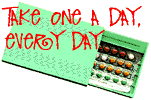Tripod Home
| New
| TriTeca
| Work/Money
| Politics/Community
| Living/Travel
| Planet T
| Daily Scoop

What is the birth control pill?
It's a pill that controls birth. But if you want to get technical, it's a pill which contains a mixture of synthetic hormones similar to estrogens and progesterone, the woman's natural hormones which prepare her body for pregnancy. The pill is one of the most popular methods of birth control.
How does it work?
Don't let the names of hormones confuse you. The most important thing to know is that the pill suppresses ovulation -- the ovaries can't release a mature egg. Without the mature egg, pregnancy is impossible. Also, the hormones increase cervical mucus, making it difficult for sperm to pass into the uterus.
How effective is the pill?
If used properly, the pill is one of the most effective methods of birth control, with a less than one percent failure rate. Because many people don't use it properly, though, the actual failure rate is more like three percent.
How do I use them?
To get started it is best to follow the advice of the clinician who prescribes the pill to you. But once you are started, you should swallow one pill at the same time every day until the pack is empty. Once it's empty, you start a new pack, continuing the same routine. Pretty simple.
The problems arise when you forget to take pills. Here's what you do if you forget:
If you forget to take one pill, take it as soon as you remember. You should still be protected from pregnancy.
If you forget to take two pills in a row, then take both as soon as you remember. Unfortunately, you can't be guaranteed protection against pregnancy, so you should use a backup method of contraception until you finish your current pack of pills.
If you forget three pills in a row, you should really consider whether the birth control pill is the right contraceptive for you. And while you're thinking, you should use a backup form of contraception, because you are not protected from pregnancy.
Advantages
One of the most effective contraceptive methods available.
Regulates the menstrual flow.
Doesn't interfere with the spontaneity of sexual activity.
There is evidence which shows that women who have used the pill have lower rates of ovarian and endometrial cancers, and possibly other gynelogical problems as well.

|
Disadvantages
The pill offers no protection from any STDs or HIV. This makes the pill a poor choice for women with multiple sexual partners, unless used in conjunction with a backup contraceptive method, such as a condom.
Some people note changes in bodily functions as a result of taking the pill. These changes include headaches, nausea, weight gain or loss, and mood changes.
Long-term side effects may include increased risk of certain medical conditions, including breast cancer, heart disease and high blood pressure.
Women who smoke have three to four times greater risk of heart attack and stroke than non-smokers on the pill.
It is necessary to consult a doctor in order to start the using the pill.
|
True Story:
 I thought the pill would be perfect
for me, I thought it would take away all my condom worries. (When they
break, when they fall off, when I run out, when I can't be bothered,
when I don't like the feeling). But then when I went on the pill, the
side effects were even worse than condoms. Perhaps I'm paranoid, but
I swear I put on weight, my skin got worse, my legs ached and I was
always moody. My boyfriend said I just needed a scapegoat, but I
stopped taking the pill anyway.
I thought the pill would be perfect
for me, I thought it would take away all my condom worries. (When they
break, when they fall off, when I run out, when I can't be bothered,
when I don't like the feeling). But then when I went on the pill, the
side effects were even worse than condoms. Perhaps I'm paranoid, but
I swear I put on weight, my skin got worse, my legs ached and I was
always moody. My boyfriend said I just needed a scapegoat, but I
stopped taking the pill anyway.
Tripod Home
| New
| TriTeca
| Work/Money
| Politics/Community
| Living/Travel
| Planet T
| Daily Scoop
Map
| Search
| Help
| Send Us Comments


I thought the pill would be perfect for me, I thought it would take away all my condom worries. (When they break, when they fall off, when I run out, when I can't be bothered, when I don't like the feeling). But then when I went on the pill, the side effects were even worse than condoms. Perhaps I'm paranoid, but I swear I put on weight, my skin got worse, my legs ached and I was always moody. My boyfriend said I just needed a scapegoat, but I stopped taking the pill anyway.